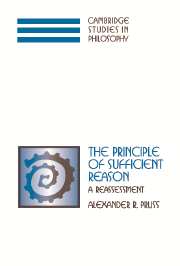Book contents
- Frontmatter
- Contents
- Acknowledgments
- Part I The Principle of Sufficient Reason and the Causal Principle
- Part II Objections to the PSR
- Part III Justifications of the PSR
- 11 Self-Evidence
- 12 Three Thomistic Arguments
- 13 Modal Arguments
- 14 Is the Universe Reasonable?
- 15 Explanation of Negative States of Affairs
- 16 The Puzzle of the Everyday Applicability of the PSR
- 17 Inference to the Best or Only Explanation
- 18 Inductive Skepticism
- 19 The Nature of Possibility
- 20 Conclusions
- Bibliography
- Index
16 - The Puzzle of the Everyday Applicability of the PSR
Published online by Cambridge University Press: 27 July 2009
- Frontmatter
- Contents
- Acknowledgments
- Part I The Principle of Sufficient Reason and the Causal Principle
- Part II Objections to the PSR
- Part III Justifications of the PSR
- 11 Self-Evidence
- 12 Three Thomistic Arguments
- 13 Modal Arguments
- 14 Is the Universe Reasonable?
- 15 Explanation of Negative States of Affairs
- 16 The Puzzle of the Everyday Applicability of the PSR
- 17 Inference to the Best or Only Explanation
- 18 Inductive Skepticism
- 19 The Nature of Possibility
- 20 Conclusions
- Bibliography
- Index
Summary
THE ARGUMENT
No one wants to deny the PSR wholesale. We all assume that airplane crashes have causes and consider it much more likely that an inspection team overlooked a cause that was there than that there was no cause. Generally, the person denying the PSR will still accept a restricted version, such as that, at least as a contingent matter of fact, every physical event in time has a prior cause, or perhaps that most macroscopic physical events have prior causes.
No one thinks that bricks pop into existence ex nihilo from time to time. The disagreement between the upholder of a robust form of the PSR and the PSR skeptic is over the status of this proposition. Is it simply a generalization contingently true, or true with high probability, or is it the result of a basic metaphysical ex nihilo nihil fit type of PSR? It is a common dialectical move that when the defender of the PSR appeals to homely cases, the opponent insists that the homely cases only support a contingent, and perhaps only true “for the most part” (to use an Aristotelian phrase), version of the PSR. But it is a mistake for the PSR's opponent to think that victory has been achieved in this way.
Let it be granted that the PSR is not metaphysically necessary and may not even hold for all events. It is still a mystery as to why it holds to the great extent that it does.
- Type
- Chapter
- Information
- The Principle of Sufficient ReasonA Reassessment, pp. 254 - 279Publisher: Cambridge University PressPrint publication year: 2006

